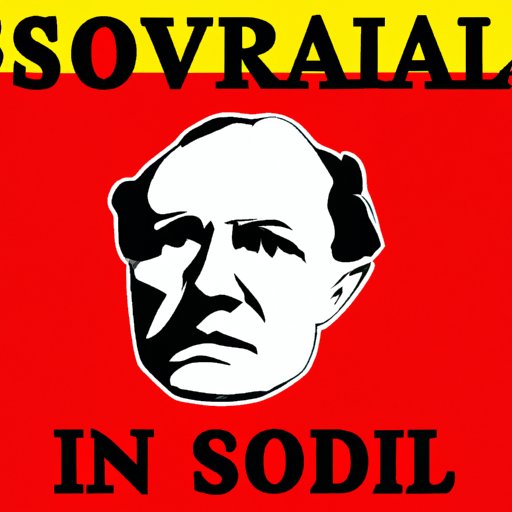Introduction
Socialism is a complex term with many different interpretations. Generally speaking, it is an economic and political system based on public or collective ownership of the means of production and distribution of goods and services. It is also characterized by strong social welfare policies and egalitarian principles, such as shared wealth and equal opportunity.
This article will explore the origins and development of socialist thought, from its roots in Enlightenment philosophy to its modern incarnations. We will examine the key figures who shaped its ideological foundations, the influences which shaped its development, the main ideological strands, the differences between versions of socialism, its impact on modern society and the challenges it faces today.

Historical Overview of the Origins of Socialism
The roots of socialism can be traced back to ancient times. There are records of communal ownership of land and resources in some early societies, and during the Middle Ages, guilds and trade unions developed in Europe as a way of protecting workers’ rights and interests.
The Enlightenment period of the 18th century saw the emergence of several political theorists whose ideas would lay the foundations for socialism. These included Thomas More, who wrote “Utopia” (1516), a book which described an ideal society based on collective ownership and social justice; Jean-Jacques Rousseau, who wrote about the importance of equality and freedom in his work “The Social Contract” (1762); and Adam Smith, who advocated for a regulated free-market economy in “The Wealth of Nations” (1776).
During the 19th and 20th centuries, socialist thought continued to develop, particularly in response to the industrial revolution and the rise of capitalism. Key figures in this period include Karl Marx, Friedrich Engels and Vladimir Lenin, who all sought to create a new form of socialism that was distinct from the utopian visions of earlier thinkers.
Biographical Profile of Key Figures in the Development of Socialism
Karl Marx (1818-83) was a German philosopher, economist and revolutionary thinker. He is perhaps best known for his seminal work “Das Kapital” (1867), which presented a critique of capitalism and proposed a more equitable alternative based on collective ownership of the means of production. Together with his collaborator Friedrich Engels (1820-95), Marx developed the ideology of Marxism, which argued for a revolutionary overthrow of the capitalist system and its replacement with a socialist one.
Vladimir Lenin (1870-1924) was another influential figure in the development of socialism. A Russian communist leader, he sought to transform Marxist theory into practice and played a major role in the Bolshevik Revolution of 1917, which established the first socialist state. Lenin also developed the idea of “democratic centralism”, which argued for a centralized state apparatus and the democratic participation of citizens in decision-making processes.
Other influential figures in the development of socialism include Mikhail Bakunin (1814-76), a Russian anarchist who argued for a decentralized vision of socialism; Rosa Luxemburg (1871-1919), a German revolutionary who advocated for a more participatory version of socialism; and Antonio Gramsci (1891-1937), an Italian Marxist who argued for a cultural transformation of society in order to achieve socialism.
Analysis of the Philosophical and Political Influences Which Shaped Socialism
The Enlightenment period of the 18th century had a profound influence on the development of socialist thought. This period saw the emergence of a new attitude towards knowledge, in which reason and science were seen as the basis for understanding the world. This philosophical shift led to the emergence of a new kind of politics, one which sought to challenge existing power structures and put forward more equitable alternatives.
Marxism was another major influence on the development of socialism. Marx and Engels argued that socialism should be achieved through a revolutionary overthrow of the capitalist system, rather than through gradual reform. They also proposed a new form of class struggle, in which the working class would unite to overthrow the ruling class and establish a socialist society.
Anarchism was another important influence on socialist thought. Anarchists argued for a decentralized form of socialism, in which individuals would have more autonomy and freedom, and decision-making would be based on consensus rather than top-down authority.
Examination of the Main Ideological Strands of Socialism
Today, there are several different ideological strands of socialism. Democratic socialism combines the ideals of social justice and equality with those of democracy and individual freedom. It seeks to create a more equitable economic system while preserving the civil liberties and democratic institutions of liberal democracies.
Marxist-Leninism is a form of socialism based on the writings of Marx, Engels and Lenin. It advocates for a centralized state apparatus and a revolutionary overthrow of the capitalist system. It has been the dominant form of socialism in many countries, including the former Soviet Union and China.
Social democracy is a more moderate form of socialism which seeks to create a more equitable society through gradual reform and the use of parliamentary democracy. It has been adopted in many countries, including Scandinavia and parts of Europe, as a way of creating a fairer and more prosperous society without sacrificing civil liberties.

Comparison of Different Versions of Socialism
One of the major debates within socialism is the question of state vs. market. State socialism argues for the nationalization of the means of production and the central planning of the economy. Market socialism, on the other hand, proposes a more decentralized approach, in which the market plays a greater role in the allocation of resources and the determination of prices.
Another debate within socialism is the question of revolutionary vs. evolutionary. Revolutionary socialists advocate for a radical overhaul of the existing system, while evolutionary socialists argue for a more gradual transition to a more equitable society.

Study of the Impact of Socialism on Modern Society
Socialism has had a profound impact on modern society. Politically, it has challenged the existing power structures and pushed for more democratic forms of governance. Economically, it has sought to create a more equitable distribution of wealth and resources. Socially, it has inspired movements for greater gender, racial and sexual equality.

Exploration of the Challenges Facing Socialism Today
In recent years, socialism has faced a number of challenges. Globalization has undermined the nation-state model of socialism, while technological advancement has increased the power of corporations and made it harder to regulate markets. Finally, the rise of populist politics has resulted in a growing political polarization, making it harder to find common ground between different ideological camps.
Conclusion
In conclusion, this article has explored the origins and development of socialist thought, from its roots in Enlightenment philosophy to its modern incarnations. We examined the key figures who shaped its ideological foundations, the influences which shaped its development, the main ideological strands, the differences between versions of socialism, its impact on modern society and the challenges it faces today. Socialism remains an important and relevant political force, and it is likely to continue to shape society for many years to come.
(Note: Is this article not meeting your expectations? Do you have knowledge or insights to share? Unlock new opportunities and expand your reach by joining our authors team. Click Registration to join us and share your expertise with our readers.)
